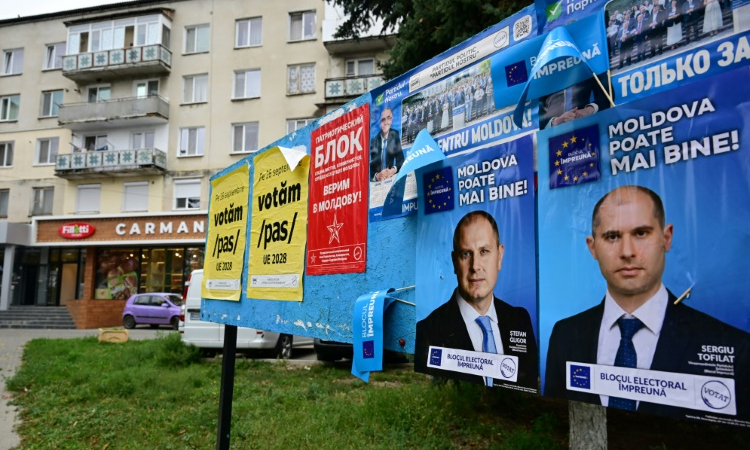News Flash

CHISINAU, Sept 28, 2025 (BSS/AFP) - Moldovans began voting on Sunday in parliamentary elections that could see the country neighbouring Ukraine swerve from its pro-European path towards Moscow, with the government and the EU accusing Russia of "deeply interfering".
Moldova, an EU candidate country, has long been divided over closer ties with Brussels or maintaining Soviet-era relations with Moscow.
Most polls show the pro-EU Party of Action and Solidarity (PAS), in power since 2021, in the lead in the vote. But analysts say the race is far from certain.
AFP journalists witnessed polling booths open at 7:00 am (0400 GMT). They will close at 9:00 pm, and the results are expected later on Sunday.
Pro-EU President Maia Sandu of PAS has called the vote Moldova's "most consequential election" and warned against falling deeper into Moscow's orbit.
"Its outcome will decide whether we consolidate our democracy and join the EU, or whether Russia drags us back into a grey zone, making us a regional risk," Sandu wrote on X on Friday.
The EU has said that Moldova is facing "an unprecedented campaign of disinformation" from Russia, while Prime Minister Dorin Recean warned of a "siege on our country".
Moscow has denied Chisinau's allegations that it is waging an online disinformation campaign and that it is looking to buy votes and stir unrest.
Moldova's largely pro-Russian opposition, in turn, has accused PAS of planning fraud.
- 'Interests of Moldovans' -
Voters in the country of 2.4 million -- one of Europe's poorest -- have expressed frustration over economic hardship, as well as scepticism over the push to gain EU membership, launched after Moscow's 2022 invasion of Ukraine.
"We must strive to serve the interests of Moldovans... We must preserve our identity, our freedom, and our family traditions," Tudor Soilita, a 33-year-old blogger, told AFP at a rally of the pro-Russian Patriotic Bloc in Chisinau this week.
A loss for PAS -- which gained a majority in the last parliamentary elections -- could throw up hurdles in the push towards EU integration.
"I hope PAS wins and we go to Europe," Olga, a pensioner who gave only her first name and who has been living abroad but came back to vote, told AFP at a PAS rally on Friday.
At that march through the capital, people shouted "We want to be in Europe" and "My country is not for sale".
In the lead-up to the vote, prosecutors have carried out hundreds of searches related to what the government says are "electoral corruption" and "destabilisation attempts", and have made dozens of arrests.
On Friday, the electoral commission excluded two pro-Russian parties from the race over financing irregularities. The opposition has slammed the decisions.
- 'Biggest effort' -
The government has accused the Kremlin of spending hundreds of millions of euros in "dirty money" to interfere in the campaign.
"It's the biggest effort, and these are the most important elections since the Republic of Moldova became independent" in 1991, Prime Minister Recean told AFP at the PAS rally on Friday.
Foreign interference and threats of stirring up unrest are "the most significant risks," according to Igor Botan, the head of Moldovan think tank Adept.
"We didn't have such phenomena before in our electoral campaigns," he told AFP.
Turnout will be decisive -- especially in the large and powerful diaspora, which tends to vote PAS, and in the breakaway region of Transnistria, which leans pro-Russian, analysts say.
Some 20 political parties and independent candidates are running for the 101 parliamentary seats.
Former president Igor Dodon of the Socialists, one of the leaders of the pro-Russian opposition, said he was "convinced the opposition will have a majority".
On foreign policy, he said he would "continue discussions, negotiations with the EU, but we will also re-establish relations with the Russian Federation".
"Moldova is ruled at the moment by a dictatorial regime which under the EU cover violates democratic norms," he told AFP, in turn accusing "the West" of interference and PAS of trying to steal the vote.
Analyst Botan said the result is "very difficult to predict".
"Post-election negotiations to form an alliance (to govern) are highly likely, and here too, things are unclear," he said.